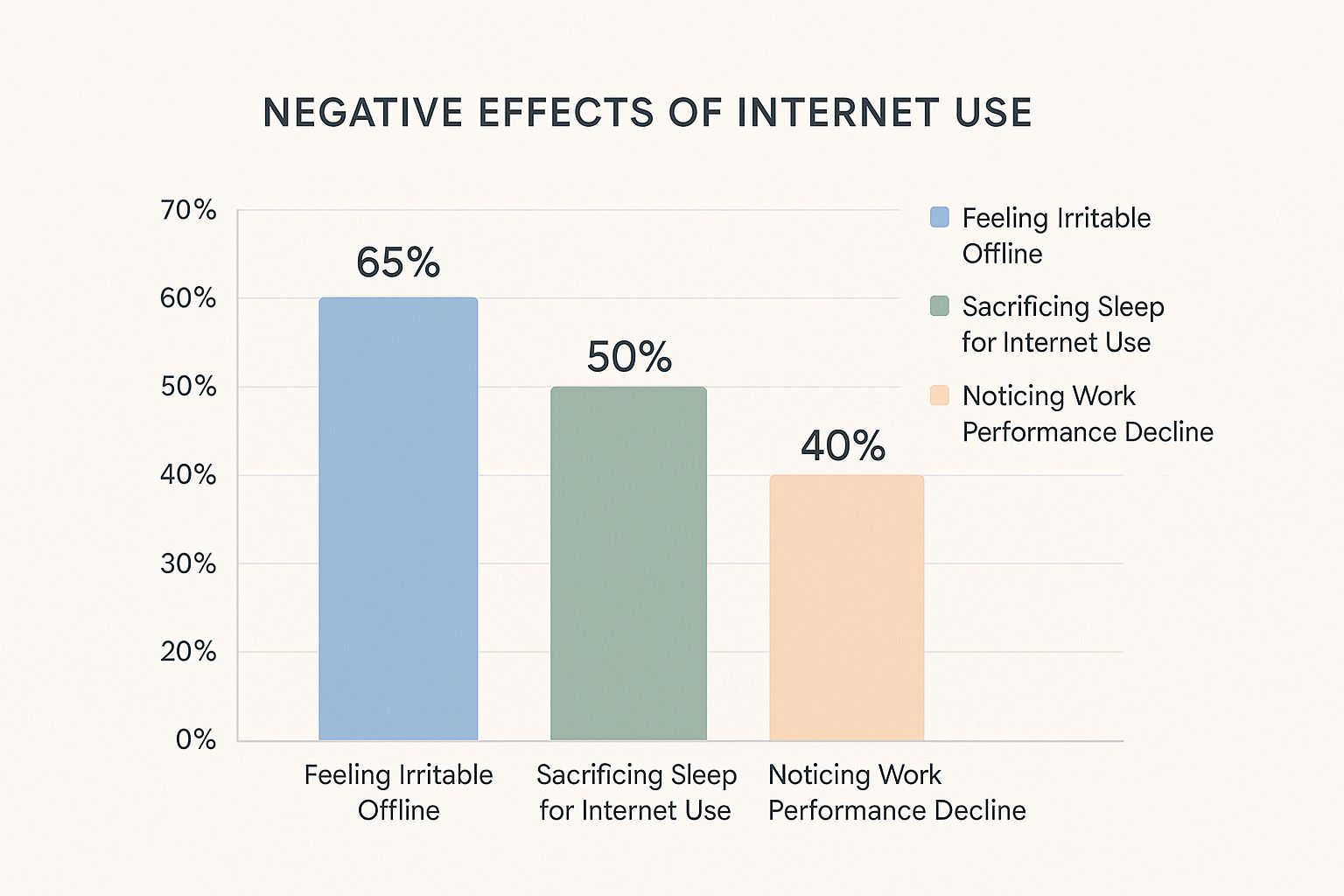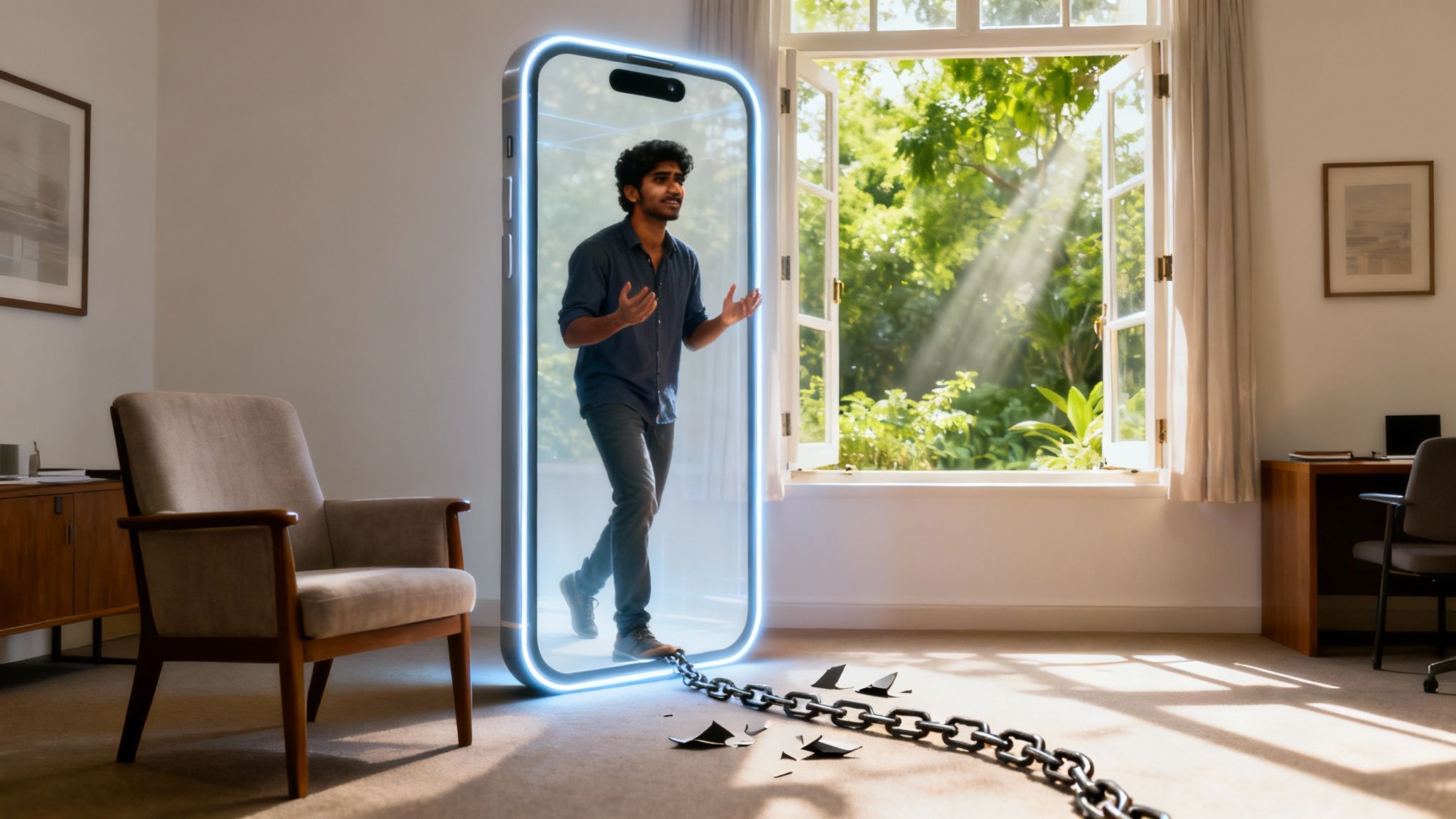Finding a healthy balance with technology often combines professional support with practical self-help strategies, strengthened by a strong support system. The goal isn't to eliminate the internet from your life, which isn't realistic in today's world. It's about regaining control of your digital habits for better overall well-being.
Understanding When Internet Use Becomes a Problem

We all spend a lot of time online. In a vast and connected country like India, the internet is essential for work, learning, and staying in touch with loved ones. It is a powerful and necessary tool.
The challenge arises when this connection slowly becomes a dependency. It's a gradual shift that can happen quietly, where the hours spent online begin to negatively affect your real life.
The Journey from Habit to Dependence
A simple habit, like checking social media, can become a dominant part of your day. The constant urge to check notifications or engage online can start to drain your mental and emotional energy.
This growing dependence can lead to feeling mentally exhausted and make it hard to focus. This is often when challenges like workplace stress, anxiety, and even feelings of depression can begin to surface, impacting key areas of your life.
- Mental Well-being: Feeling restless or moody when you can't get online.
- Relationships: Being physically present but mentally distant from family and friends.
- Professional Life: Struggling with deadlines and feeling your focus is scattered.
Building Resilience and Self-Compassion
Noticing these patterns is a positive first step toward building a healthier relationship with technology. Approaching this with self-compassion, rather than guilt, allows you to understand the challenge with curiosity.
The goal of any internet addiction treatment is not to assign labels. It's about building self-awareness and developing the resilience you need to use the digital world on your terms, so you can reconnect with what brings you happiness.
This understanding is a solid foundation for seeking support. Professional therapy and counselling offer tools to reclaim your time and attention, putting your well-being first and helping technology work for you.
Recognising the Signs of Internet Addiction
It can be difficult to tell when "a lot of time online" becomes too much. Since being connected is part of modern life in India and globally, the signs of a problem can be subtle.
The real indicator isn't the number of hours you spend online, but how those hours affect you. Noticing shifts in your mood, responsibilities, and relationships is a crucial first step in self-awareness.
Common Indicators of Problematic Internet Use
These signs often appear gradually and can vary from person to person. They generally fall into three areas: changes in your behaviour, your emotions, and your physical health. This infographic highlights a few common impacts.

Our emotional state and basic needs like sleep are often the first to be affected when our internet use becomes unbalanced. To help you reflect on your own habits, consider the following informational guide, which is not intended for diagnosis.
Common Signs of Problematic Internet Use
| Category | Example Signs |
|---|---|
| Behavioural | Neglecting work, studies, or home responsibilities. You may lose interest in hobbies and social events or find yourself hiding how much time you're online. |
| Emotional | Feeling anxious, lonely, or irritable when offline. You might experience mood swings, feeling happy online but down when you log off, or use the internet to avoid feelings of stress or depression. |
| Physical | Experiencing frequent headaches, eye strain, or back pain. Your sleep patterns may be disrupted, and you might notice changes in your weight due to different eating habits. |
If you see these signs in yourself, it's important to remember you are not alone.
A Growing Concern in India
This is a widespread issue, especially among young people. Studies on internet addiction in India show it's a growing concern for adolescents and young adults.
Recognizing these signs is an opportunity to pause and reflect. It's a chance to consider supportive counselling or therapy to reclaim your digital well-being and build lasting resilience.
How Professional Therapy Can Help
Seeking professional help is a positive and courageous step toward regaining control. Therapy offers a safe, confidential space to explore your internet habits and discover healthier ways to navigate life's challenges.

A therapist acts as a supportive guide, helping you unpack your thoughts without judgment. The goal is to build your inner resilience and improve your overall well-being, so you're in charge of your online time.
Understanding Cognitive Behavioural Therapy
Cognitive Behavioural Therapy (CBT) is a practical and effective approach used in internet addiction treatment. This type of counselling focuses on the connection between your thoughts, feelings, and actions.
For example, if you instinctively reach for your phone when you feel lonely or anxious, CBT helps you identify that trigger. You can then work with your therapist to develop healthier responses, empowering you to choose a new path. Research on CBT for internet addiction in India highlights its effectiveness.
What a Therapy Session Feels Like
Therapy is a partnership where you and your therapist set achievable goals together. You will learn practical skills for managing urges, dealing with workplace stress, and addressing underlying anxiety or depression.
Therapy provides tools and understanding to create lasting change. The aim is to help you build a life that feels more present, connected, and genuinely fulfilling.
Exploring other supportive methods, like understanding how acupuncture for stress and anxiety can help manage emotional strain, can also be beneficial.
The Role of Family Counselling
Problematic internet use often affects the entire family. Family counselling can help repair communication and build a stronger support network at home.
These sessions provide a space for family members to understand your experience and learn how to offer support. Working together helps reinforce the positive changes you're making, creating a home environment that promotes digital well-being.
Exploring Inpatient and Digital Detox Programmes

For some, stepping away from technology is a necessary step. Inpatient programmes and digital detoxes offer a supportive space away from daily digital triggers.
This break allows your mind to rest and recalibrate without constant notifications. It's an opportunity to rediscover offline joys, build real connections, and develop resilience without a screen.
What to Expect from Intensive Treatment
Inpatient internet addiction treatment offers immersive, round-the-clock support. These programs blend individual therapy, group counselling, and activities to improve overall well-being.
A typical program might include:
- Structured Daily Routines: Creating a new schedule with productive, calming activities.
- Mindfulness and Relaxation: Learning to manage stress without relying on a device.
- Skill-Building Workshops: Focusing on communication, problem-solving, and healthy coping skills.
This structured environment helps you form new habits in a place of understanding and support.
A Realistic Look at the Journey
In India, dedicated inpatient centres offer controlled settings for a digital detox. However, it's important to have realistic expectations and a strong plan for ongoing support after leaving.
Understanding broader social media addiction statistics can provide helpful context for this journey.
Choosing an intensive programme is a significant investment in your long-term happiness. These programmes are a catalyst for change, providing tools and guidance for a more balanced life.
The journey is rooted in self-compassion and a commitment to sustained well-being long after the programme ends.
Practical Strategies for Everyday Digital Wellness
Regaining control over your digital life happens through small, consistent changes. The goal is to mindfully introduce practices that help you feel more present and improve your daily well-being.
These strategies are tools for self-care, designed to help you build resilience and find more joy away from the screen.
Creating Mindful Boundaries with Technology
Setting clear boundaries for device use is an effective first step. This is about reclaiming parts of your day for focus and real connection, not about punishment.
Designating certain areas, like the dining table or bedroom, as tech-free zones can be helpful. This physical separation helps your brain switch off and signals that these spaces are for rest and connection. Following practical tips for limiting screen time can also support these efforts.
Cultivating Offline Resilience and Joy
A key part of any internet addiction treatment is rediscovering life offline. Making a conscious effort to reconnect with hobbies and interests is essential for building a fulfilling life beyond the screen.
Here are a few gentle ways to begin:
- Reconnect with Old Hobbies: Set aside 30 minutes a few times a week for an activity you once enjoyed.
- Embrace Mindful Moments: When you feel the urge to scroll, try a simple mindfulness exercise like taking five deep breaths.
- Schedule Social Time: Make intentional plans to see friends or family in person to counter the anxiety that can fuel excessive internet use.
These activities are the building blocks of emotional resilience. Each time you choose an offline activity, you reinforce that you don't need a screen to manage boredom, stress, or sadness.
Remember to be patient and compassionate with yourself. Every small step towards digital wellness is a success.
Finding the Right Professional Support in India
Taking the first step to get help is a courageous move. The conversation around mental health in India is growing, and there are many skilled professionals ready to support you.
Finding a therapist is about starting a partnership. It's important to find someone who makes you feel safe and heard, as the connection you build is key to making lasting change.
Therapy vs. Counselling: What’s the Difference?
The terms 'therapy' and 'counselling' are often used interchangeably, but they have slightly different focuses. Counselling is often shorter-term and targets a specific issue, like workplace stress.
Therapy may take a deeper look at long-standing patterns related to challenges like anxiety or depression. Platforms like DeTalks make it easier to find qualified professionals across India, reducing barriers to getting help.
Questions to Ask a Potential Therapist
Your first meeting is a chance to see if a therapist is a good fit for you. Having a few questions ready can help you make an informed decision.
- Do you have experience helping people with their internet use?
- What is your approach in a typical session?
- How will we work together to set goals?
Remember, the goal is to build a supportive relationship. This alliance can equip you with tools for self-compassion, build your resilience, and empower you to create a life that feels balanced and fulfilling.
Frequently Asked Questions
It's normal to have questions as you explore your relationship with technology. Getting clear, supportive answers can make a significant difference on your journey.
Is Internet Addiction a Real Medical Condition?
While 'Internet Gaming Disorder' is noted for further study in diagnostic manuals, most mental health professionals recognize problematic internet use as a behavioral challenge.
The focus of internet addiction treatment is less on a formal label and more on the compulsive behaviors and their real-world impact. Addressing the resulting anxiety, depression, or isolation is what truly matters.
Can I Overcome This on My Own?
Many people successfully manage their digital habits through self-help strategies and support from friends and family. Building personal resilience and having a strong support system is powerful.
However, if your internet use is causing serious issues like constant workplace stress, professional counselling can provide structured guidance. Reaching out for help is a sign of strength.
When approaching a loved one, use compassionate 'I' statements, like, "I've been feeling worried about you." This opens a door for communication and offers support, reframing the conversation around their well-being.
This shift creates a sense of partnership, making it easier for them to hear your concerns and consider getting help.
Ready to take the next step towards a more balanced life? The team at DeTalks can connect you with qualified therapists who understand the complexities of digital wellness. Explore our directory and find the right support for your journey at https://detalks.com.

Leave a Reply